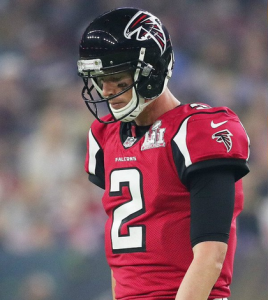Super Bowl 51 Roundup: Why Did The Falcons Choke?

Super Bowl 51 – Atlanta Falcons vs. New England Patriots
For Atlanta Falcons fans, February 5th, 2017 is a day that will live in infamy.
The Super Bowl is one of the biggest sporting events to wager on, so chances are good that you had some money on the game. If you wagered on the Patriots, right now you hopefully are rolling in the dough. But if you bet on the Falcons … well, you probably are still cursing your luck.
If you missed the game, let’s review.
In Super Bowl 51, the New England Patriots faced off against the Atlanta Falcons. Going into the game, the Patriots were the favorites. They have been a strong team for years, so that was no surprise. The Falcons were also a strong team last season, but historically they have never been particularly reliable, unless of course, we are talking about reliably failing.
So here is what happened in the Super Bowl … During the first half of the game, the Falcons were destroying the Patriots! Most people were pretty shocked by just how severe a punishment the Patriots were taking. It was also starting to look like the Falcons were going to win with ease. In the third quarter, their lead over the Patriots was an astounding 28-3.
And then they lost. That is what we call choking!
It all fell apart in the last nine minutes of the game. The Falcons were still ahead at that time by 16 points. The win probability machine over at ESPN was stating that the Falcons’ likelihood of winning the Super Bowl was 99.6%—that left very little room for doubt.
And then the Patriots caught up fast. The Falcons made one mistake after another. The game went into overtime, making it the first Super Bowl ever to do so.
By that time, things were looking pretty dire for the Falcons, in fact, it was starting to look like they did not even have a chance. It was not an illusion. They blew it. Their dreams of Super Bowl victory went down in a ball of flames.
This game will go down in Super Bowl history for two reasons:
- It was the first Super Bowl game to go into overtime.
- It was the biggest choke in NFL history.
So What Happened? Why Did the Falcons Blow It?
How does a team go from such a massive lead to such a crushing defeat? There is no single answer here, but there were a number of factors which all contributed to the choke.
There were a number of grave errors on the part of the Falcons.
Bad luck probably did play a role.
The Falcons’ defense was wearing out, but they leaned on it more and more heavily.
The Falcons never bothered trying to run up the middle.
The Falcons were inexperienced with the Super Bowl.
They choked under the pressure.
Blowing it is part of the Falcons’ identity.
First of all, it would be easy to try and chalk the loss up to a lot of bad luck. But the Falcons could have prevented this outcome.
MVP quarterback Matt Ryan made a critical fumble during the fourth quarter. The Patriots seized on that opening, with devastating consequences.
Ryan wasn’t solely responsible for his team’s downfall, however. Devonta Freeman needed to back him up, and did not deliver.
And then there was that incredible pass from Tom Brady to Julian Edelman. While it was an amazing pass, it was not unstoppable. Robert Alford could have stopped it, and he failed. That was the mistake which triggered the tied score and the subsequent overtime. The Falcons challenged it, but it stood, and that was pretty much it.
And did I mention that pass protection was a mess? Ryan was hit twelve times and sacked five.
Now, just because we should not overestimate the role of bad luck in the Falcons’ loss, that does not mean that we should ignore it either. Luck plays a role in every sport, and football is no exception. During the last nine minutes of the game, nothing seemed to go the way Atlanta needed it to, and that, like the mistakes, had consequences.

Another major problem was Atlanta’s defense.
In the beginning, they were in great shape, but after 95 plays, they started wearing out.
And then the Falcons made a big mistake. They started playing defensively.
This is a common mistake among inexperienced teams, but it is one which even experienced athletes sometimes make.
A team engaging in “prevent defense” is taking up an alignment which is designed to stop the opposing team from completing a long pass or scoring a touchdown. The idea is to try to cling to the points which the team already has and control the action by confining it to just one section of the field. If one can hold out doing this long enough, the clock will run out without the other team scoring, and one will hold onto one’s victory without taking any major risks.
The problems with this were twofold. The first is that Atlanta was ignoring the fact that New England had a strong offense.
The other problem comes back to the Falcons. Again, their defense had been severely weakened over the course of the game. And New England took advantage of that. So this was probably one of the worst things Atlanta could have done.
One of the reasons the Falcons were struggling with their offense after a while had to do with the fact that their earlier strategies stopped working once New England adapted.
Originally, the Falcons were running the ball outside. This worked great at first. Then the Patriots figured it out and made some adjustments. The strategy stopped working.
So what did the Falcons do? What they should have done was start running the ball up the middle. Maybe it would have worked, maybe not. But they didn’t bother to find out.

When the Patriots got to Super Bowl 51, they already had a great deal of experience playing Super Bowls—and winning them. Super Bowl 51 turned out to be their fifth Super Bowl victory.
The Falcons, on the other hand, had very little Super Bowl experience, and the experience they did have was bad.
Their only prior appearance was in 1998 when they faced the Denver Broncos, who defeated them.
So going into this game, all they had was one Super Bowl loss to reflect back on, and nothing else.
The Falcons probably also made a number of other mistakes which inexperienced teams are prone to make. It’s possible they may have been influenced too much by what the media and sports analysts believed. Maybe they went in with an unusual game plan that did not really play to their strengths. And the noise of the crowds could have been more than they expected.
Another mistake which inexperienced teams make is getting cozy with a lead. Again, remember that most people watching Super Bowl 51 were completely sold on a Falcons victory during the first half of the game. It is entirely possible that the team also started to assume that they were destined to win.
I would not suggest that they stopped playing hard, it was obvious they really wanted this victory. But their comfortable lead may have induced them into letting their guard down. The Patriots, experienced team that they are, were ready to exploit that.
Such a devastating turnaround also can have a serious psychological effect on a team. When you go from feeling like you are in control of a game to suddenly suffering one setback after another, the result can be confusion, anger, fear, and despair. Which leads me to the next point.

“Choking” is a term which is used inappropriately a lot of the time, but this is one case where it definitely applied. If a team has a massive lead and they suddenly crash and burn, they choked.
There are a ton of theories, reasons, and explanations for why teams choke. It is a common situation when a team is performing very well but suddenly becomes self-conscious because there is a lot on the line as there is with a Super Bowl. Suddenly the need to perform at the max leads to doubt, and then the mistakes start.
Players start shifting their attention when they are under severe pressure. Instead of simply playing the way they usually do, they start second-guessing everything, paying way too much attention to their physical movements, and hyper-analyzing and micromanaging all of their actions.
What happens when you do that? You break the procedures you have trained until they became second nature. You are no longer “in the zone.” You are just stuck inside your head.
Distraction can also cause a team to choke. And there is no situation more distracting for a team inexperienced with Super Bowls than a chance to compete in one for the first time in nearly two decades.
An individual athlete only has so much attention to dedicate to his task. If his resources are pulled in other directions, he is going to have a harder time performing.
In short, the Falcons showed up to Super Bowl 51 seeking redemption and that created a colossal amount of pressure to contend with. When it started to look like victory was slipping out of their grasp, they choked. At that point, they started making the very mistakes that cost them that victory.
Speaking of the struggle for redemption, there is one more reason the team may have choked—and that is that it has become a part of who they are. The Falcons are a team which are known for ripping their fans’ hearts out and shredding their hopes. They have failed time and again.
The problem is that after such a long devastating history, failure becomes an expectation not just for fans, but also for players.
Even if they have an actual shot at victory, on a deep-seated unconscious level, there is always a voice whispering in their heads telling them that they cannot rise above their past—that they are in a sense cursed.
What Does the Future Hold For the Falcons?
Overcoming the identity of failure and throwing it aside for once and for all will be no easy feat but it is certainly something the Falcons are capable of.
The Falcons have a lot going for them. They have an outstanding quarterback and a strong offensive line, (which they underutilized in the Super Bowl). Consider that they wrapped up their season with the eighth-highest point total in the history of the sport. That is no small feat.
Many of the mistakes which the team made during Super Bowl 51 were avoidable and psychological factors did play a role. The team did choke, and choked hard. They do not have to choke in the future.
Could Atlanta go right back to weak performance and wait another 19 years to reach the Super Bowl? Sure, but there is no reason to expect that. Could they make it back again next year? Maybe, maybe not, but it is not outside the realm of possibility.
Lessons for Bettors from Super Bowl 51
Do not panic at halftime.
There is no such thing as a betting “lock.”
You cannot underestimate the role of psychology in NFL football.

I actually mentioned this in my Super Bowl 51 guide. Halftime results do not necessarily predict the outcome of a Super Bowl game.
This was certainly a case of that being true. How many punters do you want to bet were backing the Patriots at the start of the game, and then freaked out at halftime and placed live bets to cancel out their original bets?
And then the Patriots turned around and won anyway, just as they were initially predicted to do.
That does not mean there are not situations where it would make sense to switch the team you are backing at halftime, but you need to have a good reason.
And actually, there probably were good reasons in this case, but if you dug deeper, you might have found equally good (or better reasons) to hold onto your original bet.
In the world of betting, what we call a “lock” is a bet which is practically guaranteed to win.
Sometimes people who sell you locks do guarantee that they will win.
A 28-3 lead sure felt like a sure thing. But if you thought that it really was a lock, you would have been totally wrong.
The Patriots victory in Super Bowl 51 is just another reminder that in the world of sports betting, nothing is totally certain.
When you look at sports analysis, it is easy to get lost in the facts and figures. Objective, quantifiable data certainly is important, but it is definitely not everything.
It is often said that in sports, about half of all victories are determined by flukes.
But what causes those flukes? Sometimes it is a matter of luck, but other times, perhaps it is the unseen, subjective influence of psychology which leads to an unexpected development on the field.
What should we take from all of this?
So take these factors into account when you are trying to predict what will unfold at a game, especially if it is a game as important as the Super Bowl where pressure is going to play a much more substantial role than it might at a regular NFL game.
Hopefully the Falcons learned some serious lessons from their disastrous performance in Super Bowl 51 and hopefully as a bettor, you now have some lessons under your belt which will help you to win your wagers on next year’s Super Bowl!
Check out Bovada, the best Sportsbook for USA NFL bettors, and get a welcome bonus up to $250!
More Great Articles:



